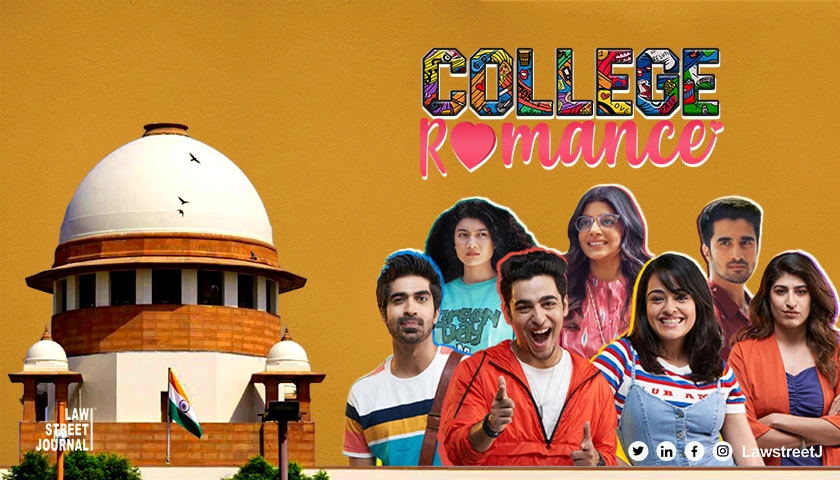NEW DELHI: The Supreme Court on Tuesday held that the availability of content that contains profanities and swear words cannot be regulated by criminalising it as obscene since vulgarity and profanities do not per se amount to obscenity.
A bench of Justices A S Bopanna and P S Narasimha said while a person may find vulgar and expletive-filled language to be distasteful, unpalatable, uncivil, and improper, that by itself is not sufficient to be obscene.
The court quashed a criminal case of obscenity lodged against actors and makers of the Web Series named 'College Romance'.
The bench pointed out it is well-established from the precedents that vulgarity and profanities do not per se amount to obscenity and if the matter has a preponderating social purpose and gain that overweighs the obscenity of the content (such as medical textbooks), then such material is constitutionally protected by freedom of speech and cannot be criminalised as obscene.
The court set aside the Delhi High Court's order, which refused to quash the obscenity case against the lead casts and makers of the web series.
The court said the enquiry under Section 292 of the IPC or under Section 67 of the IT Act does not hinge on whether the language or words are decent, or whether they are commonly used in the country. Rather, the inquiry is to determine whether the content is lascivious, appeals to prurient interests, or tends to deprave and corrupt the minds of those in whose hands it is likely to fall as vulgarity and profanities do not per se amount to obscenity.
In the case, the bench said, No offence of publication or transmission of any material in electronic form, which is obscene, lascivious, or appealing to prurient interest, and/or having the effect of tending to deprave and corrupt persons, as provided under Section 67 of the IT act (Information Technology Act, 2000), is made out."
The court said the metric to assess obscenity and legality of any content cannot be that it must be appropriate to play in the courtroom while maintaining the courts decorum and integrity.
Such an approach unduly curtails the freedom of expression that can be exercised and compels the maker of the content to meet the requirements of judicial propriety, formality, and official language. Here again, the High Court committed a serious error in decision-making, the bench said.
The bench said while a person may find vulgar and expletive-filled language to be distasteful, unpalatable, uncivil, and improper, that by itself is not sufficient to be obscene.
Obscenity relates to material that arouses sexual and lustful thoughts, which is not at all the effect of the abusive language or profanities that have been employed in the episode, the bench said.
The bench said by taking the literal meaning of these words, the high court failed to consider the specific material (profane language) in the context of the larger web-series and by the standard of an ordinary man of common sense and prudence.
The court said when it noticed the use of such language in the context of the plot and theme of the web-series, which is a light-hearted show on the college lives of young students, it is clear that the use of these terms is not related to sex and does not have any sexual connotation.
Neither did the creator of the web-series intend for the language to be taken in its literal sense nor is that the impact on a reasonable viewer who will watch the material. Therefore, there is a clear error in the legal approach adopted by the High Court in analysing and examining the material to determine obscenity, the court said.
In the instant case, the high court made several remarks on the need to maintain linguistic purity, civility, and morality by retaining the purity of language and deprecating the representation of expletives-filled language as the new normal.
The real test is to examine if the language is in any way obscene under Section 67 of the IT Act. The approach adopted by the High Court, as explained earlier, is based on irrelevant considerations," the bench said.
The bench said the high court has equated profanities and vulgarity with obscenity, without undertaking a proper or detailed analysis into how such language, by itself, could be sexual, lascivious, prurient, or depraving and corrupting.
The bench stressed on maintaining a delicate balance between protecting freedom of speech and artistic freedom on the one hand, and public decency and morality on the other.
The bench noted that when art and obscenity are mixed, the art must be so preponderating that the obscenity is pushed into the shadows or is trivial and insignificant and can be overlooked.
Similarly, if the matter has a preponderating social purpose and gain that overweighs the obscenity of the content (such as medical textbooks), then such material is constitutionally protected by freedom of speech and cannot be criminalised as obscene, the bench said.
Read Judgment

















